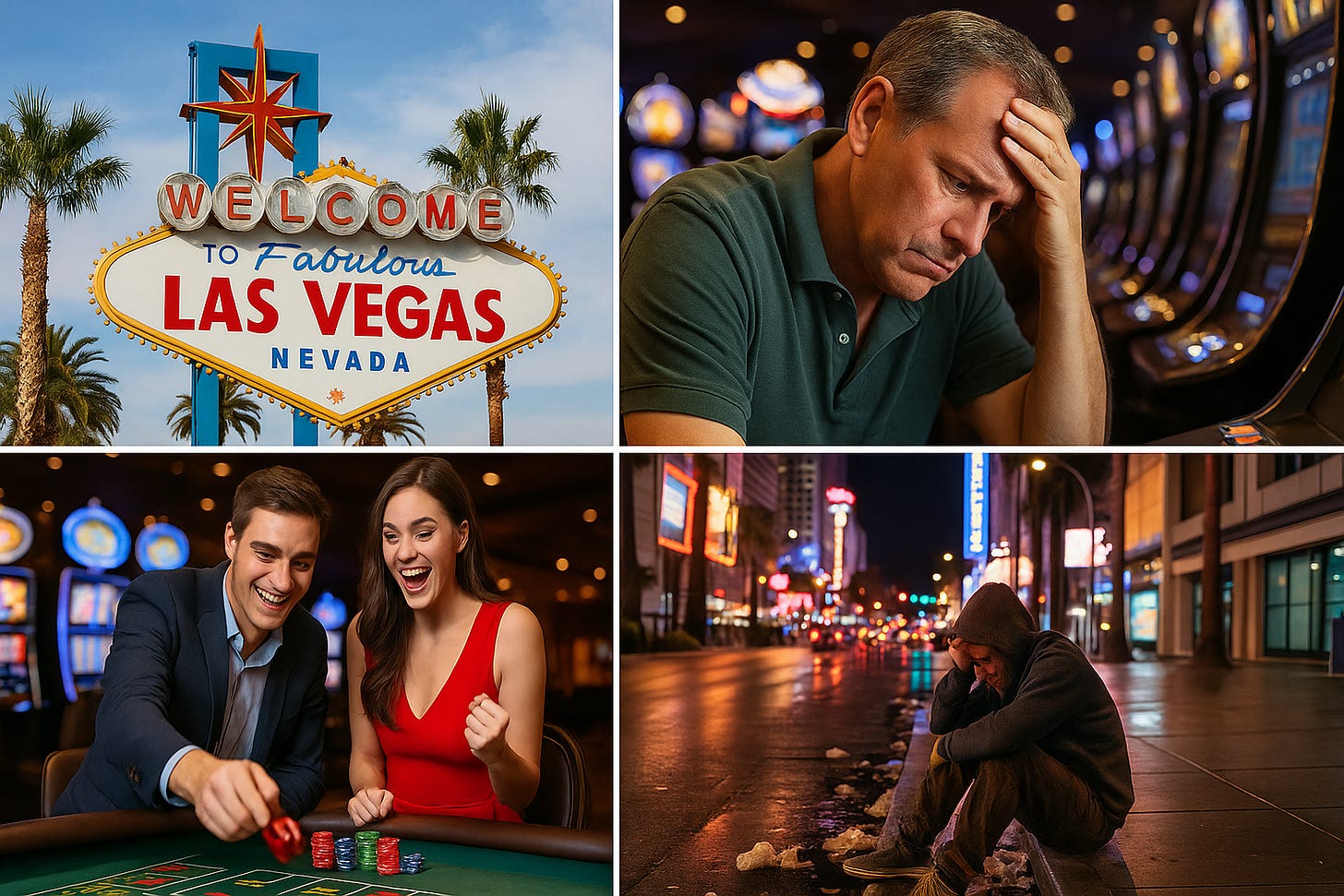How the Peak-End Effect Skews Our Memories — and What You Can Do About It
Was my Trip To Vegas Really That Bad (or That Good)?
We don’t remember experiences the way we think we do.
You might recall your last trip to Las Vegas and say, “It was amazing!” or “Never again!” However, if you dissect the experience, you might realize that your memory of the entire trip is based more on just a couple of moments than on the whole visit. That’s not a fluke. That’s psychology.
Specifically, it’s the Peak-End Effect at work.
What Is the Peak-End Effect?
The Peak-End Effect is a psychological bias where people judge an experience primarily by its most emotionally intense moment (the “peak”) and by how it ended, not by how they felt throughout the experience.
This theory was popularized by Nobel Prize-winning psychologist Daniel Kahneman and his colleague Barbara Fredrickson, who found that people’s retrospective evaluations of events are shaped far more by key moments than the entire timeline of the experience.
In simple terms:
Memory ≠ Average of all moments
Memory ≈ Peak + End
This explains why two vacations with similar itineraries can be remembered completely differently based on just one moment of ecstasy or one terrible ending.
The Vegas Case Study
Let’s say your most recent trip to Las Vegas included the following:
Day 1: Long flight delay and cranky taxi driver
Day 2: Won $500 at a blackjack table and felt invincible
Day 3: Long, hot walks along the Strip and some overpriced meals
Day 4: Got food poisoning from a late-night taco
Day 5: Had a relaxing spa morning and flew home without issue
How will you remember this trip? It depends heavily on your peak and end.
If the win at the casino was your emotional high point and your spa day + smooth departure made for a pleasant ending, your brain may classify this trip as a win, even if 70% of the time was average or frustrating.
Flip the scenario: If the taco incident was your peak moment of misery, and the end was a stressful TSA line or a delayed flight, you might walk away with the sense that “Vegas was a disaster,” even if most of the days were fine.
Why It Feels So Real (But Isn’t)
Your brain is built for storytelling, not for data collection.
We compress our experiences into highlight reels. The middle? Often forgotten. But the peaks and the finale? Burned in. Our memory doesn’t care about fairness or statistical averages. It cares about emotional weight.
This isn’t just for travel—it applies to:
Relationships: A rocky breakup can sour years of good memories.
Jobs: A bad last project or tough final weeks can erase years of accomplishment.
Movies: A boring ending can make a decent film feel like a waste of time.
How the Peak-End Effect Warps Travel
Travel is particularly vulnerable to the Peak-End Effect because it’s inherently emotional: you spend money, time, and energy chasing joy, escape, or meaning. That emotional investment amplifies both the highs and lows.
Think about your favorite vacation. Odds are, you’re remembering the best moment and the final impression, not how bored you were during the layover or how much time you spent looking for your rental car.
So What Do We Do About It?
Let’s not fight the Peak-End Effect. Let’s design around it.
Here are some practical tips to use it to your advantage, especially on your next trip to Las Vegas (or anywhere else):
1. Intentionally Create a Peak
Don’t leave your best moment up to chance.
Schedule something memorable—a VIP show, a once-in-a-lifetime meal, or a helicopter ride. This will become the emotional anchor of your experience.
Reverse-engineer the memory you want to have.
2. End on a High Note
If your trip ends with stress, fatigue, or logistical hassles, that will color the entire memory. Consider:
Booking a late checkout so you’re not rushed
Treating yourself to a final meal or activity you love
Avoid scheduling tight connections or obligations immediately after your trip
The last few hours should be calm, controlled, and joyful—something you want to remember.
3. Reflect Wisely
When you come home, don’t just accept the emotional summary your brain hands you. Ask:
“Am I remembering the trip, or just the most and last emotional parts of it?”
This is especially useful when a trip feels like a letdown. You may discover the majority was solid—it just ended badly.
4. Use It to Evaluate Future Choices
If you’re deciding whether to return to Vegas, your opinion may be skewed by this bias. Don’t rely only on how you felt at the end or at your peak. Consider the whole arc. Ask:
What did I enjoy throughout?
What did I tolerate or dislike?
What would I do differently next time?
This helps create more accurate assessments and better decisions.
“Vegas Was a Disaster… Or Was It?”
I recently spoke with someone who said, “Vegas was a nightmare—I’m never going back.” But when we unpacked the trip, it turned out:
She’d had a great second night at a Cirque du Soleil show
She enjoyed three excellent meals
She lost money on the last day and had a nightmare return flight
Her peak and end were negative. So, despite four days of fun and laughter, the memory was stained.
After we talked, she realized: “Maybe it wasn’t all bad. Maybe it was just the way it ended.”
You don’t remember every step—you remember the spark and the send-off.
Understanding the Peak-End Effect gives you the power to design better experiences and to reflect on them more fairly. So, whether your last Vegas trip was euphoric or exhausting, take a second look.
You may not need to change your travel plans next.
Just change how you end it, or at least the story you tell about it.





